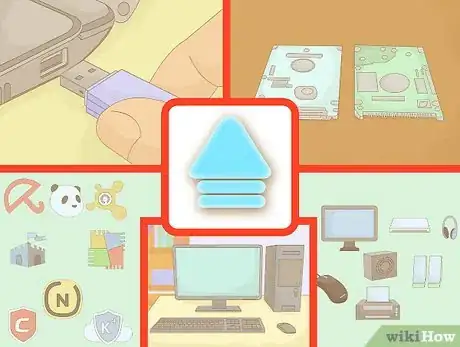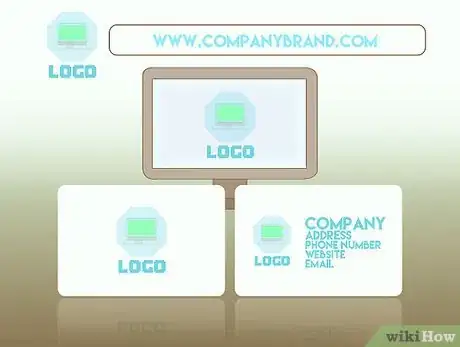This article was co-authored by Luigi Oppido and by wikiHow staff writer, Christopher M. Osborne, PhD. Luigi Oppido is the Owner and Operator of Pleasure Point Computers in Santa Cruz, California. Luigi has over 25 years of experience in general computer repair, data recovery, virus removal, and upgrades. He is also the host of the Computer Man Show! broadcasted on KSQD covering central California for over two years.
This article has been viewed 170,749 times.
While your dream may be to start the next Apple or Microsoft out of your garage, it is more likely that your desire to start a computer business involves dealing with existing systems via sales, service, or support. With the rapid changes in technology that have already led some to place us in the “post-PC era,”[1] the job of a computer repair person , for instance, has changed quite a bit from ten years ago and will surely be quite different ten years from now. Beyond keeping up with changing technology and maintaining your expertise, however, starting a computer business requires many of the same skills required of any other small business field — things like a clear business plan, a smart marketing strategy, and outstanding customer service.
Steps
Aligning Your Skills and Goals With the Market
-
1Assess your skill set. It seems reasonable to assume that anyone harboring ideas of starting a computer business already has a deep familiarity with computers and related systems. That said, the particulars of your training and experience, and your willingness to learn more, are vital in determining the type of computer business best suited to your talents.
- Have you ever dissected, reassembled, or repaired a computer? Are you familiar with all major operating systems? Have you worked in the computer field before? Honestly assess your readiness to start a computer business, or ask someone else with industry knowledge help you make the assessment.
- Completing a degree in the computer field will certainly help you in starting a business, but it is unlikely that most customers will ask to see your diploma. More important is your ongoing gathering of experience, whether through education, training, or employment.
- Certification is a good way to indicate expertise, though. You may want to seek A+ certification from the Computer Technology Industry Association (CompTIA), or the related N+ network certification, or become a Microsoft Certified System Engineer (MCSE).[2] These can help give your business card an air of legitimacy.
-
2Analyze the local market. With any small business, you need to carefully consider the local demographics, the identity and needs of your target population, and the particular products and services they are likely to desire. How can you tailor your planned business to meet these conditions?
- In this so-called “post-PC era,” you may find demand for traditional computer sales, service, and/or support to be much reduced, especially among a younger, tech-savvy population. However, especially in areas with older populations and/or small-town and rural areas, you may find a greater percentage of people in need of PC repairs and support. Remember, you need to keep up with the latest technology; many of your potential customers do not (and will not).[3] [4]
Advertisement -
3Consider your business options. Despite changing technology and consumer tastes, there are still opportunities to establish a business based on sales of computers, parts, or accessories; editing and design services; troubleshooting and/or training; and repairs or refurbishments. The key is flexibility and an ability to change along with the technology.[5]
- New technology is meant to make life easier, but many consumers find it to be just another layer of confusion. General set-up and troubleshooting tasks, like setting up printers and wireless networks, data recovery and wiping, and media archiving or editing, may remain a viable component of your business, even if PC repair requests decrease.
- If you can prove yourself to be an expert on computers and related technology, and can build a positive reputation, you should be able to find a niche for your computer business.
-
4Set your goals. Are you looking to start a computer business as a side job, or a source of supplementary income? Or are you hoping to build the business into your full-time career? Either way, it is probably best to start small and determine the market and prospects for your business over a period of time.[6]
- If you’re looking to keep your computer business as a part-time job, then keeping your focus on repairs and troubleshooting may suffice.
- Building your business into a full-time occupation, however, may require further diversification of the products and services you offer, perhaps by selling parts, accessories, or entire systems. You’ll need to draw in a loyal client base and build a positive reputation in the community.
Succeeding in the Computer Business
-
1Keep up-to-date. Even if a major focus of your business turns out to be fixing obsolete desktops for customers not interested in making a change, you need to maintain your expertise on emerging technologies. Complacency in a field that changes as fast as computer technology can leave you behind the curve before you realize what has happened.
- Even if computers are your focus, expect people to seek help and guidance with all sorts of mobile technology, from phones to tablets to watches. You may or may not want to get into the mobile tech sales and/or service business — consider the increased inventory demands, for instance — but being able to provide general troubleshooting, training, and support on the latest devices may prove quite useful.[7]
- If home service calls are part of your business, the essential toolkit you take with you will continue to shift along with technology. However, you can find a good list of basic equipment you’ll need (for the time being) at https://www.technibble.com/categories/starting-computer-repair-business/.
-
2Make customer service your priority. If you have terrible people skills, it probably won’t matter how great you are with the machines — your computer business is not likely to succeed. When customers have a computer need or problem, they expect fast, efficient, effective service that is also explained to them in a way that can be clearly understood by even computer novices.[8]
- You’ll deal with panicked customers who think they’ve just lost all their important files, irate customers who want immediate help at 10 p.m., and hovering customers who want to supervise (and ask about) every move you make. You need to be able to remain calm, courteous, and patient. As a small business, you’re not likely to be able to match the prices of your larger competitors — the personalized service you offer needs to offset this disadvantage.
-
3Build your brand identity. A new computer business, like any other small business, needs to make a quick and lasting impression in order to survive. Even (or maybe especially) if you are running your business out of your home office, you need to establish a consistent brand that builds awareness and indicates quality and reliability.
- Put some thought to your business name, logos, signage, marketing, etc. Create a professional look that presents your business as legitimate and lasting.[9]
- Referrals will be essential to your business. Always hand out professional-looking business cards to existing customers, and consider offering referral discounts or rewards. Throwing in some free service or equipment is a small price to pay in order to build up your customer base.[10]
- Especially if you don’t have a storefront, make your business website and/or social media presence appear professional and interconnected to your overall brand.
-
4Think about your business location. A successful computer business can operate primarily out of your own home, in customers’ homes, or in an office / store location. Weight the pros and cons of your options, keeping in mind your budget and your goals for the business.[11]
- Working from home, for instance, offers more flexibility and less overhead costs, but also offers less visibility and possibly more distractions. A well-placed storefront adds to your visibility and helps legitimize your business in the public’s mind, but it comes at a cost and tends to lock you into a more rigid schedule.
- If you focus on computer repairs, working in your own shop may limit distractions and save you time and travel money, but customers may be more comfortable with you working on the equipment in their homes. (Your potential liability is also likely to be reduced when you don’t take the equipment with you.)
Starting a Small Business: Some Basics
-
1Start with a business plan. No matter what business you are getting into, you should always start by developing a detailed business plan. It will describe the nature of your business, the products / services you will offer, your budget, marketing plan, and target customer base, and project your business’ growth for several years to come. It is the guidebook for your business’ development, and your “sales pitch” to potential investors or financial contributors.
- See How to Write a Business Plan for a good primer on the process of creating this important document.
-
2Protect yourself and your business. Starting a legitimate business is not as simple as doing a little advertising and collecting money from customers. To create a business that can succeed and grow, you need to understand the process of legally starting a business, collecting and paying taxes, obtaining insurance and any permitting, licensing, or certification requirements, and becoming an employer (should you eventually hire help).
- You may want to save on taxes by having customers pay cash “under the table” and not reporting the income, but this gives your business an air of illegitimacy (as well it should) for your customers. You are better off paying the taxes and appearing (and being) legitimate.[12]
- How to Open a Small Business offers some nice information on the legal requirements of establishing a business. The U.S. Small Business Administration website is also a great resource; see, for instance, https://www.sba.gov/content/follow-these-steps-starting-business.
-
3Become a part of the community. You’ll need the community to support your small business in order for it to succeed, of course. Engaging with and supporting the community with your business can help to create a mutually-beneficial relationship.[13]
- Volunteer some of your time and expertise. Be a supporting sponsor at community events (with the requisite public recognition, of course). Use your advertising and branding to develop a sense of stability and permanence for your business, even in a field that changes as rapidly as computers.
- No matter the nature of your small business, you need to be visible, you need to be reliable, and you need to provide a personalized experience that builds customer loyalty.
Expert Q&A
Did you know you can get expert answers for this article?
Unlock expert answers by supporting wikiHow
-
QuestionHow can I start my own computer business?
 Luigi OppidoLuigi Oppido is the Owner and Operator of Pleasure Point Computers in Santa Cruz, California. Luigi has over 25 years of experience in general computer repair, data recovery, virus removal, and upgrades. He is also the host of the Computer Man Show! broadcasted on KSQD covering central California for over two years.
Luigi OppidoLuigi Oppido is the Owner and Operator of Pleasure Point Computers in Santa Cruz, California. Luigi has over 25 years of experience in general computer repair, data recovery, virus removal, and upgrades. He is also the host of the Computer Man Show! broadcasted on KSQD covering central California for over two years.
Computer & Tech Specialist Offer great service. If you want to have your own computer shop, you have to be able to provide good customer service. If you can't talk to people and break down what's wrong with their machine in layman's terms, you aren't going to keep customers. You also have to be able to decipher what problem your customer is describing, since they might not know the exact technical term for what's going on. Also, give the customer options. Make sure your customer knows that they're spending their money responsibly. For instance, if a customer has a $600 fix on a $300 machine, let them know that you don't necessarily recommend that. That way, your customers will know they can trust you, and they'll be more likely to come back as repeat customers.
Offer great service. If you want to have your own computer shop, you have to be able to provide good customer service. If you can't talk to people and break down what's wrong with their machine in layman's terms, you aren't going to keep customers. You also have to be able to decipher what problem your customer is describing, since they might not know the exact technical term for what's going on. Also, give the customer options. Make sure your customer knows that they're spending their money responsibly. For instance, if a customer has a $600 fix on a $300 machine, let them know that you don't necessarily recommend that. That way, your customers will know they can trust you, and they'll be more likely to come back as repeat customers. -
QuestionWhat do I need to start a small computer repair business?
 Luigi OppidoLuigi Oppido is the Owner and Operator of Pleasure Point Computers in Santa Cruz, California. Luigi has over 25 years of experience in general computer repair, data recovery, virus removal, and upgrades. He is also the host of the Computer Man Show! broadcasted on KSQD covering central California for over two years.
Luigi OppidoLuigi Oppido is the Owner and Operator of Pleasure Point Computers in Santa Cruz, California. Luigi has over 25 years of experience in general computer repair, data recovery, virus removal, and upgrades. He is also the host of the Computer Man Show! broadcasted on KSQD covering central California for over two years.
Computer & Tech Specialist
-
QuestionWhat is the minimum budget for starting a computer business?
 Community AnswerThere is no minimum, but starting a business, especially a technology-based one, can be very expensive. Figure out what you plan on selling, figure out registering fees, etc.
Community AnswerThere is no minimum, but starting a business, especially a technology-based one, can be very expensive. Figure out what you plan on selling, figure out registering fees, etc.
References
- ↑ https://www.technibble.com/moving-wearable-mobile-repair-post-pc-era/
- ↑ http://www.computerhope.com/issues/ch001553.htm
- ↑ https://www.technibble.com/moving-wearable-mobile-repair-post-pc-era/
- ↑ https://www.technibble.com/categories/starting-computer-repair-business/
- ↑ http://www.mytopbusinessideas.com/computer/
- ↑ http://www.yfncg.com/how-to-start-a-computer-business/
- ↑ https://www.technibble.com/moving-wearable-mobile-repair-post-pc-era/
- ↑ http://www.tomshardware.com/answers/id-1813630/starting-computer-repair-setup-consulting-business-tips.html
- ↑ http://www.yfncg.com/how-to-start-a-computer-business/
About This Article
To start up a successful computer business, find a way to match your skills with the needs of your local computer market. Assess the training and experience that you have with computers to determine the type of computer business that is best suited to your talents. For example, if you have experience building personal computers, you can use your background to start up a business selling discounted computers that you assemble from parts that you acquire. In addition to your skills and experience, it’s important that you analyze the market around you to see if you can start a successful business. Consider the demographics in your area and think about what type of computer products or services they’re likely to purchase. For example, if you’re selling discounted computer systems, and your area has a large number of older people looking to buy a simple home computer, you may have a market for your business! For tips about how to build your brand identity when you’re starting a computer business, keep reading!







































































